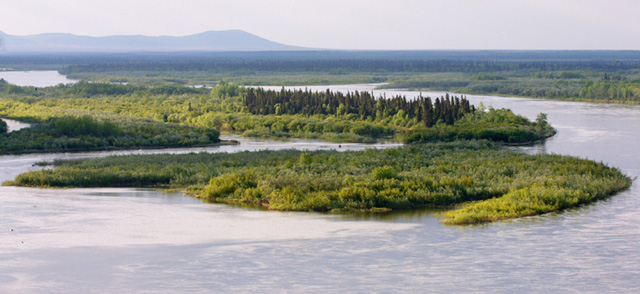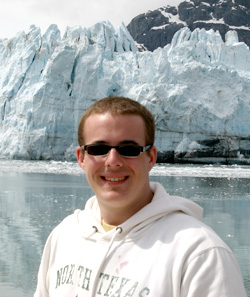
On his phone was an email from his mom. The first part was a personal message: “I’m so proud of you.” The rest was forwarded correspondence between the vice president of the Zale Corporation and his legal department. The country’s second largest jewelry retailer had decided to change its gold purchasing policies to be more socially and environmentally responsible – all because of the HSU junior’s final paper for Jeff Dunk’s Natural Resource Conservation class.
Pitcher’s assignment was to write a brief study on an existing conservation project. As a long-time lover of Alaska, he focused his energies on this part of the world, finally settling on the efforts to stop a mining project in Bristol Bay, Alaska.
The controversial mining project had already generated a large community outcry. Not only were there concerns about fishing and wildlife jobs that would be disrupted by the mining, there were concerns about the area’s wild sockeye salmon runs.

Bristol Bay’s Nushagak and Kvichak River watersheds are home to one of the largest Sockeye salmon runs and mining in the area could have serious negative effects on their population. “The more I learned about the project,” Pitcher says, “the more I felt I had to do something about it.”
So he did.
Pitcher found a pledge online where jewelry companies could promise not to purchase minerals from the Bristol Bay mine. The pledge was created by No Dirty Gold, an organization promoting responsible sale and purchase of gold. And, since his mother is employed as a purchaser for the Zale Corporation, Pitcher used his connections to get a meeting with the Vice President of the company to try to convince them to sign the Bristol Bay pledge.
It was 4 p.m. on a Friday when Pitcher walked into the Zale corporate headquarters in Irving, Texas. In his nicest suit, he made his way to the vice president’s office with his laptop and Power Point presentation ready to go.
Pitcher walked in nervous, but prepared and left feeling less than successful. He never used his laptop or Power Point. Even his suit felt out of place – it was casual Friday and the vice president was in jeans and a short-sleeved button-up. “In 30 minutes I had said everything I had come to say,” Pitcher says. “I felt like I did everything I could do, but I felt like I was getting brushed off.”
For the next few months, Pitcher sent follow-up emails to Zale Corporation, but no progress was made toward signing the pledge. Then out of the blue, he received the email from his mom. “I’m so proud of you,” she says. “You actually made a difference.”
The Zale Corporation, whose 2,100 stores and kiosks earned $48 million in 2007, had decided to sign the Bristol Bay pledge. And its reforms didn’t end there. “Not only were they going to sign this pledge, but the company decided to reform its whole supply chain auditing process,” Pitcher says. “They basically increased oversight on gold supply and made the process more transparent.”
After receiving the news, Pitcher contacted the vice president of the corporation to congratulate him on the decision. In return, the vice president told Pitcher that his “input and persistence were instrumental,” in the decision.
“It really started my week off right,” Pitcher says.